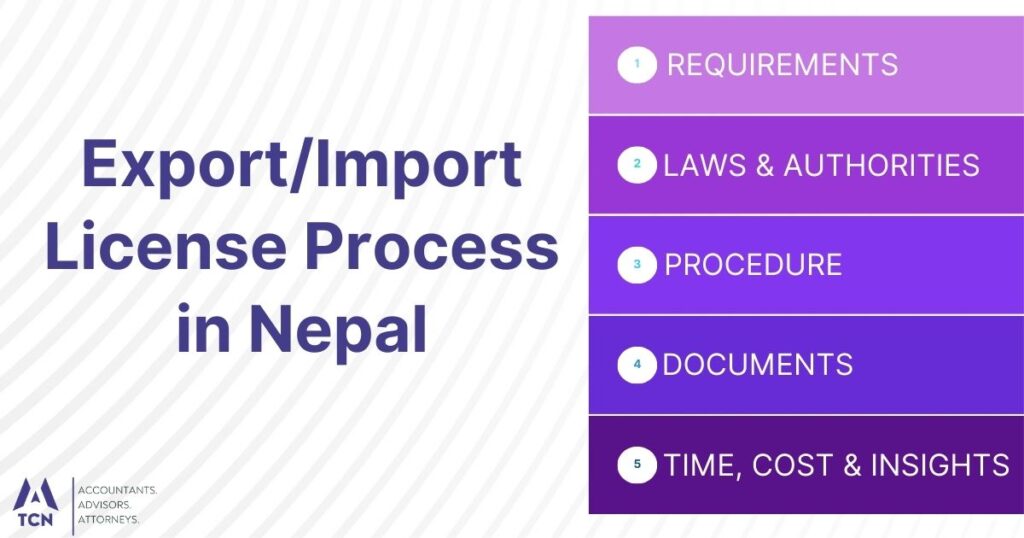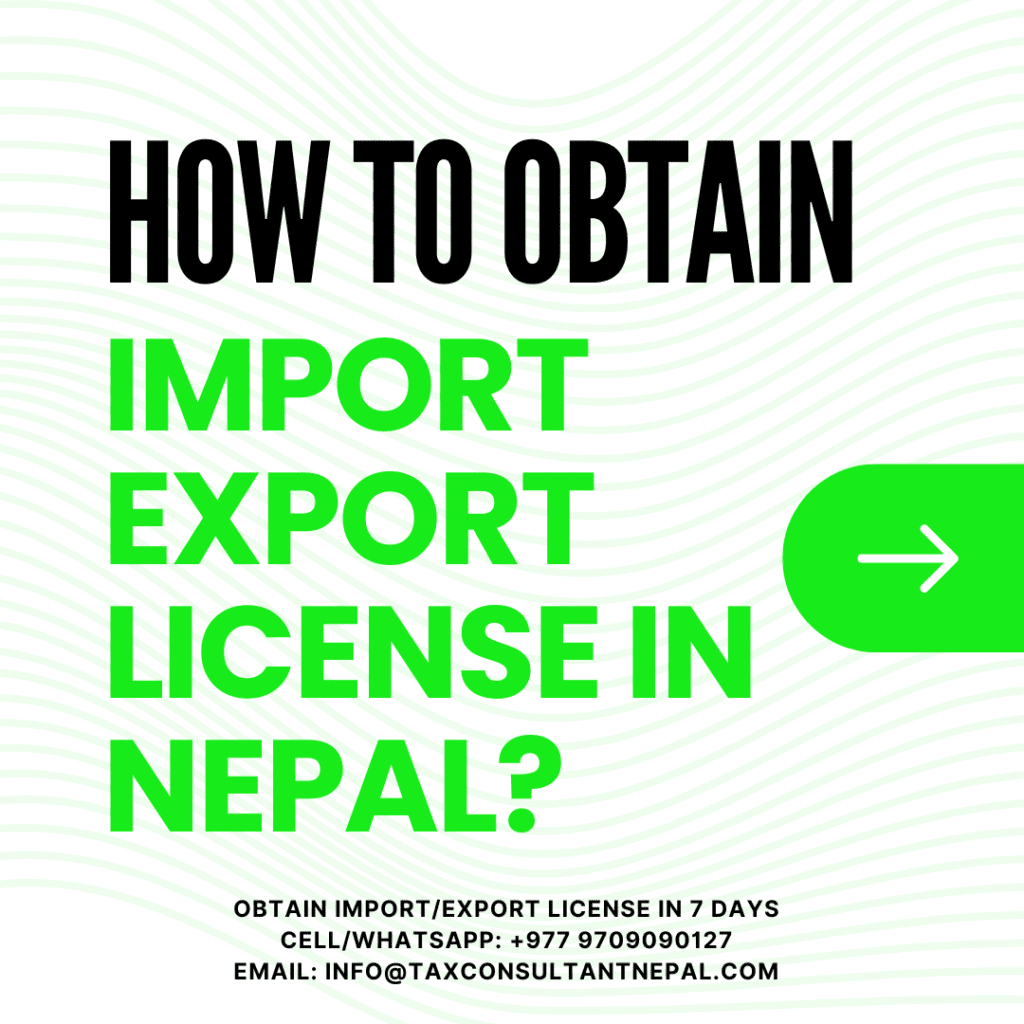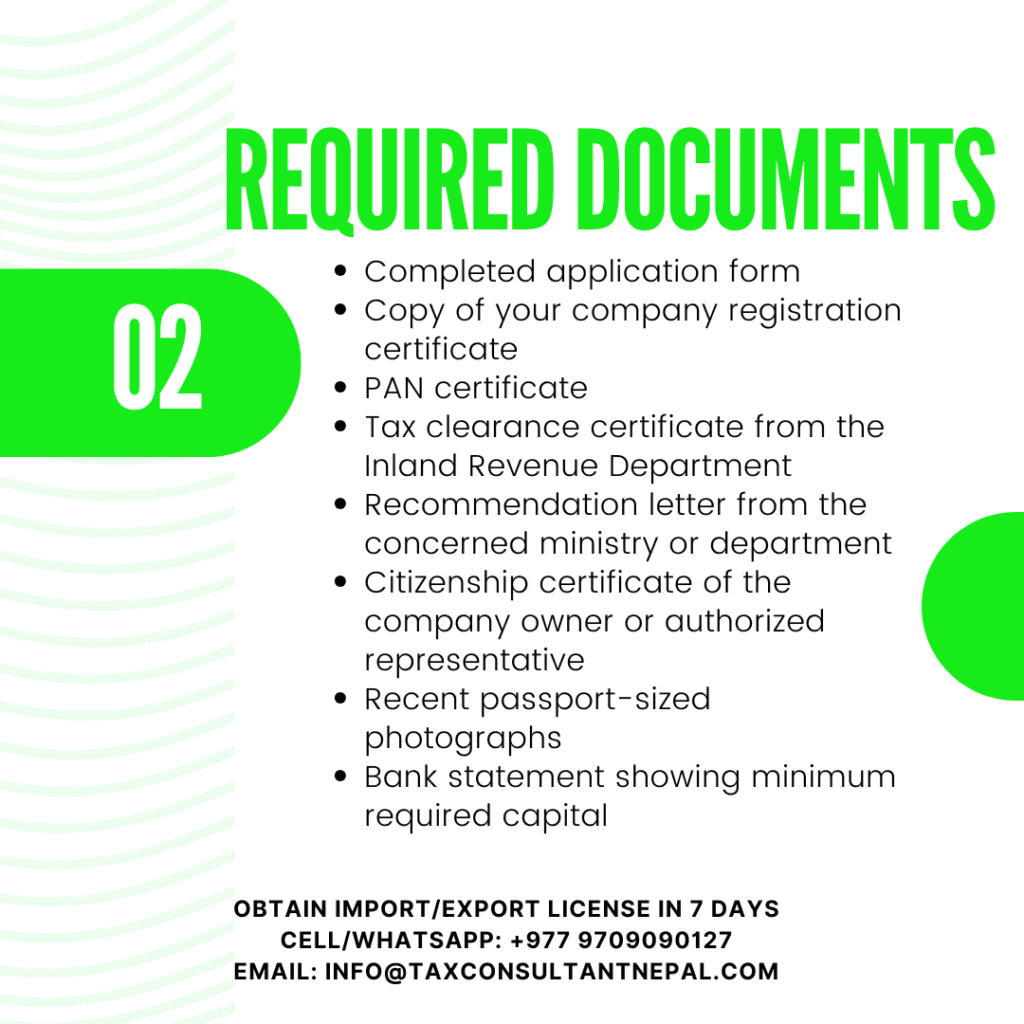Are you looking to start an import/export business in Nepal? One of the crucial steps in this process is obtaining the necessary license. This guide will walk you through the steps to secure your export/import license in Nepal, providing you with essential information to get your business up and running.
How to Make Import Export License?
Import Export License in Nepal
- Step 1: Registration of Company at OCR
- Step 2: Tax Registration (VAT) at IRD & Ward Registration
- Step 3: Opening of Bank Account with NPR 3 Lakhs Bank Guarantee
- Step 4: Issuing Share Registry at OCR
- Step 5: Registration at Department of Commerce
- Step 6: Obtaining EXIM Code (Import-Export License)
Who Needs an Export/Import License in Nepal?
Any individual or company planning to engage in international trade activities in Nepal must obtain an export/import license. This requirement applies to:
- Businesses involved in exporting Nepalese goods to foreign countries
- Companies importing foreign products into Nepal
- Traders dealing with both import and export activities
- Manufacturers who directly import raw materials or export finished goods
- Agents or intermediaries facilitating international trade transactions
It’s important to note that even if you’re planning to conduct occasional or one-time import/export transactions, you’ll still need to acquire the appropriate license to comply with Nepalese regulations.
Where to Apply for an Export/Import License?
To apply for an export/import license in Nepal, you’ll need to visit the Department of Commerce, Supply and Consumer Protection (DoCSCP). This government body is responsible for issuing and regulating trade licenses in the country. Here’s what you need to know:
- The DoCSCP has offices in major cities across Nepal, with its headquarters in Kathmandu.
- You can submit your application in person at the nearest DoCSCP office.
- Some districts may have local offices that can assist with the initial application process.
- It’s advisable to check the DoCSCP website or contact them directly for the most up-to-date information on office locations and hours of operation.
Remember to prepare all necessary documents before visiting the office to ensure a smooth application process.
What Documents Are Needed for an Export/Import License?
Gathering the required documents is a crucial step in obtaining your export/import license. The DoCSCP requires the following paperwork:
- Completed application form (available at the DoCSCP office or website)
- Copy of your company registration certificate
- PAN (Permanent Account Number) certificate
- Tax clearance certificate from the Inland Revenue Department
- Recommendation letter from the concerned ministry or department (if applicable to your product category)
- Citizenship certificate of the company owner or authorized representative
- Recent passport-sized photographs
- Bank statement showing minimum required capital
- Lease agreement or ownership documents for your business premises
Ensure all documents are current and properly certified. Having these ready will speed up your application process significantly.
How Long Does Export/Import License Approval Take?
The timeline for obtaining an export/import license in Nepal can vary depending on several factors. Generally, you can expect the process to take:
- 7 to 14 working days for a standard application with all documents in order
- Up to 30 days if additional verifications or inspections are required
- Longer processing times during peak seasons or if there are discrepancies in your application
To help expedite the process:
- Double-check all your documents for accuracy and completeness before submission
- Respond promptly to any requests for additional information
- Follow up regularly with the DoCSCP on your application status
- Consider using a licensed agent familiar with the process to assist you
Remember, patience is key, as thorough processing ensures compliance with Nepalese trade regulations.
Relevant Articles:
- Process of Filing for Property Tax in Nepal
- Labor Audit and Compliance in Nepal
- Tax Assessment Appeal in Nepal
What Is the Cost of an Export/Import License?
The cost of obtaining an export/import license in Nepal includes both government fees and potential additional expenses. Here’s a breakdown of what you can expect to pay:
- Application fee: NPR 1,000 to 5,000 (varies based on business type and scale)
- License issuance fee: NPR 2,000 to 10,000 (depends on the category of license)
- Renewal fee: Usually 50% to 75% of the initial issuance fee
- Document certification costs: Varies, but budget around NPR 500 to 1,000
- Bank guarantee or security deposit: Amount varies based on trade volume
Additional costs to consider:
- Legal or consultancy fees if you choose to use professional services
- Travel expenses if you need to visit multiple offices
- Potential fines for late renewal or non-compliance
It’s advisable to keep some extra funds on hand for unforeseen expenses during the application process.
Are There Different Types of Export/Import Licenses?
Yes, Nepal offers various types of export/import licenses to cater to different business needs and trade activities. The main categories include:
- General Export/Import License:
- Covers a wide range of products
- Suitable for businesses dealing with multiple product types
- Specific Product License:
- Issued for particular product categories
- Often required for regulated goods like pharmaceuticals or electronics
- Temporary License:
- For short-term or one-time trade activities
- Useful for businesses testing new markets
- Service Trade License:
- Focused on export/import of services rather than physical goods
- Applicable to IT, consulting, and other service-based industries
- Re-Export License:
- For goods imported temporarily and then exported
- Common in processing or value-addition industries
- Deemed Export License:
- For domestic sales treated as exports due to foreign currency transactions
- Often used in special economic zones
When applying, clearly specify the type of license that best fits your business model and trade activities.
How Often Must Export/Import Licenses Be Renewed?
Keeping your export/import license up to date is crucial for maintaining legal compliance and uninterrupted business operations. In Nepal, the renewal process and frequency are as follows:
- Standard renewal period: Annually (every 12 months from the date of issuance)
- Grace period: 35 days after expiration without penalty
- Late renewal: Possible within 6 months of expiration, but subject to fines
Key points to remember:
- Start the renewal process at least 30 days before your license expires
- Prepare updated versions of all original application documents
- Pay the renewal fee, which is typically lower than the initial licensing fee
- Submit a brief report of your import/export activities from the previous year
- Be prepared for a potential inspection or audit during renewal
Setting up reminders and keeping thorough records throughout the year can make the renewal process much smoother.
What Products Require Special Export/Import Permissions?
While a standard export/import license covers many products, certain items require additional permissions or specialized licenses due to their nature or potential impact. These include:
- Pharmaceuticals and medical supplies
- Weapons and defense-related equipment
- Precious metals and stones
- Endangered species or products derived from them
- Hazardous chemicals and materials
- Certain agricultural products and seeds
- Cultural artifacts and antiques
For these categories:
- You may need approval from specific ministries or departments
- Additional documentation and inspections are often required
- Stricter regulations and monitoring may apply throughout the trade process
Always check with the DoCSCP or relevant government bodies for the most current list of restricted items and special permission requirements.
Can Export/Import Licenses Be Obtained Online?
In recent years, Nepal has been working towards digitizing various government services, including the process of obtaining export/import licenses. However, the current status of online applications is as follows:
- Partial online services are available through the DoCSCP website
- You can download application forms and check the status of your application online
- Some initial steps of the application process can be completed electronically
However:
- Physical submission of documents is still required in most cases
- In-person verification may be necessary at certain stages of the process
- Final approval and license issuance typically involve visiting the DoCSCP office
While full online processing is not yet available, keep an eye on official announcements for updates on digital services. The government is continually working to streamline these processes.
What Government Body Issues Export/Import Licenses?
The primary government entity responsible for issuing export/import licenses in Nepal is the Department of Commerce, Supply and Consumer Protection (DoCSCP). This department operates under the Ministry of Industry, Commerce and Supplies. Key points about the DoCSCP include:
- It’s the central authority for trade-related licenses and permits
- Responsible for implementing trade policies and regulations
- Oversees compliance with international trade agreements
- Provides guidance and support to businesses engaged in foreign trade
While the DoCSCP is the main issuing body, other government agencies may be involved in the process, such as:
- Ministry of Agriculture for agricultural products
- Department of Drug Administration for pharmaceutical imports/exports
- Nepal Rastra Bank for foreign exchange-related matters
Always start with the DoCSCP for your licensing needs, and they will guide you to any additional departments if necessary.
The Process of Obtaining an Export/Import License in Nepal
Securing your export/import license in Nepal involves several steps. Here’s a comprehensive guide to help you navigate the process:
- Business Registration:
Ensure your company is properly registered with the Office of Company Registrar. This is a prerequisite for applying for any business license in Nepal. - Document Preparation:
Gather all required documents, including your company registration certificate, PAN card, tax clearance certificate, and other paperwork mentioned earlier in this guide. - Application Submission:
Visit your nearest DoCSCP office with your completed application form and supporting documents. Pay the required application fee at this time. - Initial Review:
DoCSCP officials will review your application for completeness and accuracy. They may request additional information or clarification if needed. - Background Check:
The department may conduct a background check on your business and verify the information provided in your application. - Site Inspection:
For certain types of businesses or products, a physical inspection of your premises may be required to ensure compliance with regulations. - Final Approval and License Issuance:
Once all requirements are met and verifications are complete, the DoCSCP will approve your application and issue your export/import license.
Throughout this process, maintain open communication with the DoCSCP, respond promptly to any requests, and be prepared for potential delays. While the standard timeline is about two weeks, complex applications or those requiring additional permissions may take longer.
Remember, obtaining your license is just the beginning. Familiarize yourself with ongoing compliance requirements, record-keeping obligations, and renewal procedures to ensure smooth operations of your import/export business in Nepal.
How to get Import Export License in Nepal?
Step 1: Register your business at camis.ocr.gov.np.
Step 2: Obtain PAN/VAT from the Inland Revenue Office.
Step 3: Submit an application for Import Export Code (IEC) at the Department of Customs.
Step 4: Pay applicable fees and collect the license.
How to obtain Import License Consultant ?
To Find the best Import License Consultant:
1. Search online directories or Contact Tax Consultant Nepal
2. Verify their expertise in trade and licensing.
3. Consult trade associations for recommendations.
4. Hire based on their track record and terms.
How to register Import Export Company in Nepal?
Import Export Company Registration in Nepal
Step 1: Register your company under the Company Act 2063 at camis.ocr.gov.np.
Step 2: Obtain PAN/VAT from the Inland Revenue Office.
Step 3: Apply for an IEC from the Department of Customs.
Step 4: Ensure compliance with customs and trade policies.
What is the cost for Import Export License?
The Cost for obtaining the license are as follows:
Business registration: Starts from NPR 4,500/-
PAN/VAT registration: Additional costs apply.
IEC issuance fee at Customs: Varies by business type.
Miscellaneous expenses: Documentation, consultancy, and notarization.
What are the requirements for Import Export in Nepal?
The Requirements are as follows:
1. Registered Company or Business either PAN/VAT
2. Must have obtained Exim Code from the Department of Customs
3. Must have bank account and completed all licenses and permits
4. Must have deposited Bank Guarantee
5. Must be compliant with custom and trade laws.
What are the documents required for export from Nepal?
The Documents Required are as follows:
1. Certificate of Origin
2. Export License or Permit
3. Invoice and Packing List
4. Customs Declaration Form
5. GMP for Food Products or Manufactured Products
6. Legal Registration Certificates
How to import goods to Nepal from Foreign Countries?
To Import goods to Nepal from Foreign Countries:
Step 1: Register a business and obtain PAN/VAT.
Step 2: Obtain an Import Export Code (IEC) from Customs.
Step 3: Submit import documents like invoice, bill of lading, and customs declaration.
Step 4: Pay customs duties and clear goods.







